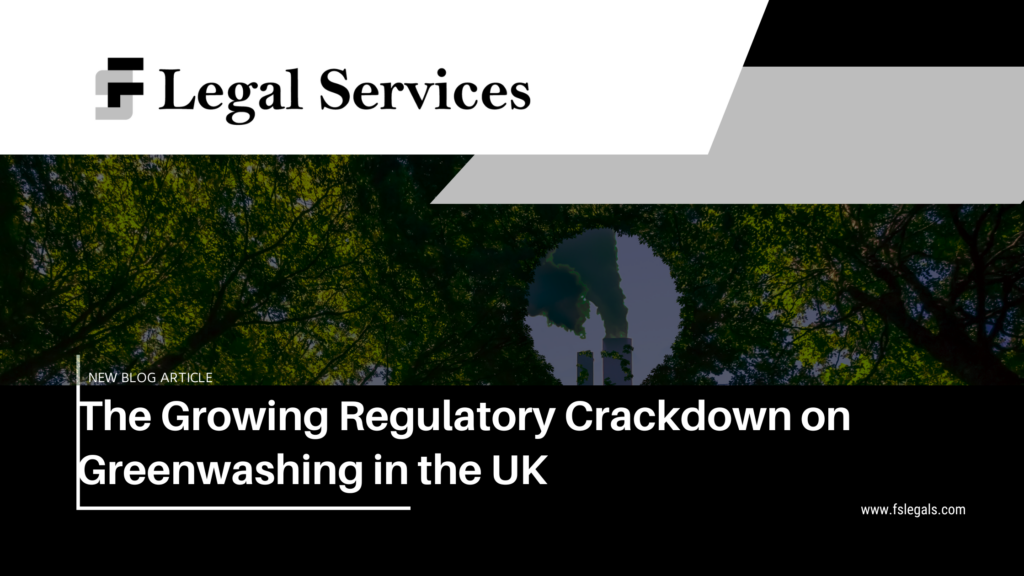
In recent years, greenwashing—where businesses market themselves as more environmentally friendly than they actually are—has become a significant concern in the UK. As sustainability becomes a key focus in boardrooms, companies are increasingly held accountable for their claims. The regulatory landscape surrounding greenwashing has tightened, with agencies like the Competition and Markets Authority (CMA), Advertising Standards Authority (ASA), and Financial Conduct Authority (FCA) all taking action.
Regulatory Efforts to Tackle Greenwashing
UK regulators are increasingly committed to combating greenwashing. The CMA’s Green Claims Code, introduced in 2021, provides guidelines on how companies can communicate their environmental claims. It insists that claims must be truthful, clear, unambiguous, and substantiated with evidence. The ASA also enforces strict advertising rules, ensuring that companies making absolute claims of sustainability can back them up. The FCA, meanwhile, has introduced an anti-greenwashing rule aimed at the financial services sector, requiring that firms make sustainability-related claims that are clear, fair, and not misleading.
One significant key development is the Digital Markets, Competition and Consumers (DMCC) Act, passed in 2024. This act introduces substantial reforms to competition and consumer law, marking a major shift in how companies are held accountable for false environmental claims.
Stronger Consumer Protection Against Greenwashing
One of the most impactful changes introduced by the DMCC Act is the enhanced enforcement powers granted to the Competition and Markets Authority (CMA). The CMA now has the authority to impose fines of up to 10% of a company’s global annual turnover for breaches of consumer law, including greenwashing. This brings false environmental claims in line with other serious offenses like unfair contract terms and misleading commercial practices. Companies caught making unsubstantiated green claims face unprecedented financial penalties, highlighting the need for transparency in environmental marketing.
Misleading Green Claims Under Scrutiny
The CMA has made greenwashing a top priority, and the DMCC Act equips the regulator with the tools to aggressively target companies deceiving consumers. With the ability to impose sanctions without lengthy court proceedings, the CMA can quickly act against businesses making false environmental claims. For companies operating in the UK, any claims about sustainability, carbon footprints, or eco-friendly products must now be backed by solid, verifiable evidence.
This crackdown is particularly focused on digital spaces. The CMA is increasing its scrutiny of how businesses use online marketing, consumer-facing AI, and digital choice architecture to shape consumer decisions based on environmental claims. In online marketing, greenwashing can be more subtle, with eco-friendly messages embedded in product descriptions or through targeted advertising. The new law makes clear that digital marketing is no exception—businesses must ensure their environmental claims in the digital space are just as transparent as those made elsewhere.
Penalties for Non-Cooperation
The DMCC Act introduces harsh penalties for procedural breaches as well. Companies that fail to cooperate with CMA investigations into greenwashing can face fines of up to 1% of their global annual turnover, even before any formal findings of wrongdoing are made. This includes failing to provide necessary information, breaching directions, or hindering investigations. There are also daily fines for continued non-compliance, ensuring that businesses not only avoid making false green claims but are also fully prepared to cooperate with investigations.
High-Profile Cases: Lessons for Businesses
In the UK, several high-profile greenwashing cases have already made headlines. For example, the CMA’s investigation into ASOS and Boohoo, launched in 2023, focused on whether these companies had overstated the environmental benefits of their products, potentially breaching consumer protection laws. Meanwhile, the Advertising Standards Authority (ASA) cracked down on misleading green claims in the aviation sector, banning airlines from running advertisements that downplayed the environmental impact of air travel.
These cases send a clear message: businesses making false green claims will not go unpunished. Companies must ensure that all environmental statements are backed by credible evidence. Failure to do so can result in not only hefty fines but also long-term reputational damage.
How Businesses Can Avoid Greenwashing Pitfalls
To avoid greenwashing, businesses must ensure that their sustainability claims are transparent, verifiable, and consistent with reality. The Green Claims Code, developed by the CMA, offers six guiding principles that businesses should follow:
- Truthful and Accurate: Claims must reflect actual environmental benefits.
- Clear and Unambiguous: The language used should not mislead consumers.
- No Omission: Key information should not be hidden or omitted.
- Meaningful Comparisons: Comparisons with other products must be fair and reasonable.
- Full Lifecycle Consideration: Environmental claims should consider the entire lifecycle of the product.
- Substantiated: Claims must be backed by solid evidence.
Businesses must ensure that their environmental marketing practices align with regulatory expectations. It’s also advisable for companies to engage with legal and compliance teams to ensure their marketing and communication strategies are in line with the latest regulatory standards.
The Path Forward: Compliance is Key
The regulatory crackdown on greenwashing is set to intensify as the DMCC Act is fully implemented. With increased penalties and the CMA’s enhanced focus on digital markets, businesses must ensure that all their environmental claims are transparent and supported by verifiable data. Greenwashing is no longer just a marketing concern—it has evolved into a serious legal risk.
The CMA’s new powers, combined with a strong emphasis on consumer protection and digital marketing practices, make the DMCC Act a turning point in how businesses approach sustainability claims. Companies should take immediate steps to align their marketing practices with the new regulations, or risk facing significant financial and reputational damage.
Stay Informed with FS Legal Services
Subscribe to our newsletter and get the latest legal insights, industry updates, and expert advice delivered straight to your inbox. Stay ahead of the curve with our tailored content, designed to keep you informed and empowered.